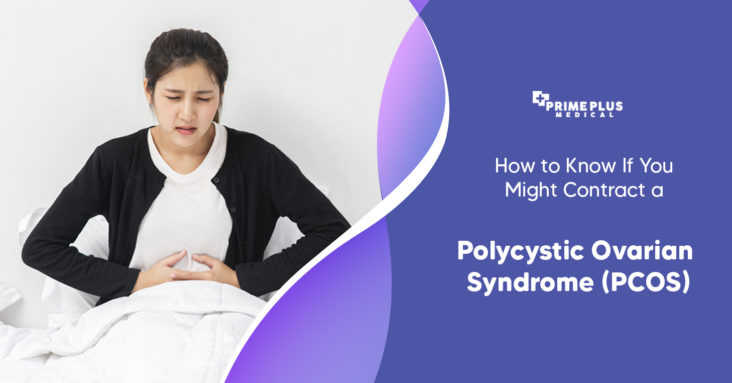Some women in their reproductive years are going through a common hormonal disorder that is familiar as a polycystic ovarian syndrome (PCOS). What is it, how dangerous is it, and what to do about it? Check out more! Prime Plus Medical Clinic in Bali is explaining the condition in the following article.
In a normal state, female ovaries contain a lifetime supply of eggs that are stored in fluid structures called follicles. These eggs are immature and every month will be directed to maturation. The follicles will expand their size by follicles-stimulating hormones secreted by our pituitary gland at the base of the brain namely FSH (follicle-stimulating hormone) and LH (luteinizing hormone). As the eggs mature, the follicles secrete estrogen. When this happens, it signals the brain to send a surge of LH from the bloodstream to the ovaries. This will trigger the mature follicles to release eggs that we know as the ovulation process. The eggs will travel to the fallopian tube and wait for fertilization by sperm. If this process does not occur then the eggs and the lining of the uterus will shed into menstruation.
What Happens to Women with Polycystic Ovarian Syndrome (PCOS)
Polycystic Ovarian Syndrome (PCOS) causes women in their reproductive ages to have irregular menstruation periods. There is an imbalance of LH that goes to your bloodstream. The abnormally high amount disrupts your menstrual cycle. The ovaries keep on producing more follicles containing fluid. As a result the eggs are not mature and the ovaries cannot discharge them regularly. It will be a problem for women with PCOS to identify their exact fertile time or ovulation and they also have a high risk of infertility.
The immature follicles do not dissolve and remain as fluid-filled sacs or sacs. Usually, the blood in women with PCOS will contain a high level of insulin. High levels of insulin and LH combined can trigger excess production of testosterone (male hormone) in your ovaries. Testosterone prevents the ovulation process and might also lead to infertility.
The Cause of Polycystic Ovarian Syndrome (PCOS)
The cause of PCOS remains a question until today. However, if we do not treat the condition properly, it may lead to complications like heart disease, endometrial cancer, cholesterol abnormality in the blood, high blood pressure, and type 2 diabetes. According to a study, as high as 80% of PCOS is often found in women with upper-body or android obesity. The symptoms are worse in women with obesity. Therefore, early treatment usually also comes with a certain weight loss program.
Family history might also be responsible for PCOS. However, the exact genes to blame for the disorder are not yet identified.
Three Key Features of PCOS
You are experiencing PCOS when you get these two or three signs such as:
- Irregular menstrual cycles, where you might have prolonged or fewer periods in a year.
- High levels of testosterone production (the most common androgen that is produced in both males and females (lesser in amount). You can notice male physical features in women with excessive androgen including hirsutism (thick hair growth on their face and body), serious acne, and male-like hair loss.
- Polycystic ovaries, a condition where there are a lot of follicles surrounding your eggs, causing them to enlarge yet do not mature.
Treatment Recommendations
There is no exact medicine to cure Polycystic Ovarian Syndrome (PCOS). However, if you want to regulate the better menstrual cycle and increase your chance of pregnancy, your doctor may recommend treatments such as:
- Hormonal birth control to lower testosterone production and regulate the menstrual cycle
- Anti-androgen to decrease abnormality in acne and hair growth
- Diabetes drugs to reduce insulin level and regulate the menstrual cycle
- Fertility drugs to stimulate ovulation and pregnancy
- Laparoscopic ovarian drilling procedure, this procedure will need your surgeon to insert a small needle with an electric current to interrupt testosterone production in variant tissues so ovulation can happen.
- Refining your body composition and reducing insulin resistance by exercise routine and healthy meal plan
Related article: Facts About PMS and When to See a Doctor for Your Symptoms
Detect Early Polycystic Ovarian Syndrome (PCOS) to Avoid the Complications
There is nothing more miserable than having a hard time conceiving for married women. we couldn’t agree more to suggest you take early preventive measures to detect Polycystic Ovarian Syndrome (PCOS) to allow you the ease of life during your reproductive age. Find help at our clinic in Bali now at +6281237387131

